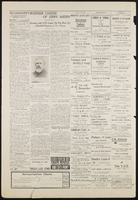Search the Special Collections and Archives Portal
Search Results

Meeting minutes for Consolidated Student Senate University of Nevada, Las Vegas, October 17, 1985
Date
Archival Collection
Description
Text

Alpha Kappa Alpha Sorority, Theta Theta Omega Chapter meeting minutes (redacted)
Date
Archival Collection
Description
From the Alpha Kappa Alpha Sorority, Incorporated, Theta Theta Omega Chapter Records (MS-01014) -- Chapter records file.
Text

Epilogue: Nevada Southern University Yearbook, 1966
Date
Description
Yearbook main highlights: schools and departments; detailed lists with names and headshots of faculty, administration and students; variety of photos from activities, festivals, campus life, and buildings; campus organizations such as sororities, fraternities and councils; beauty contest winners; college sports and featured athletes; and printed advertisements of local businesses; Institution name: Nevada Southern University, Las Vegas, NV
Mixed Content

Mariteresa Rivera-Rogers oral history interview: transcript
Date
Archival Collection
Description
Oral history interview with Mariteresa Rivera-Rogers conducted by Maribel Estrada Calderón on October 24, 2018 for the Latinx Voices of Southern Nevada Oral History Project. In this interview, Mariteresa discusses her early life in Concepción, Chile. She talks about her experience moving to Las Vegas, Nevada in 1965, the immigration process at the time, and becoming a Spanish language court interpreter. Rivera-Rogers recalls enrolling at the University of Nevada, Las Vegas' (UNLV) Sam Boyd School of Law, and her involvement with the Latino Bar Association. Lastly, Rivera-Rodgers discusses the challenges in translating Spanish language to English.
Text

Transcript of interview with Elizabeth "Betty" Krolak by Irene Rostine, September 26, 1995
Date
Archival Collection
Description
In 1962, Elizabeth “Betty” Krolak moved from the Midwest to Las Vegas with her husband and six children. Not only would the drier desert climate benefit her youngest daughter’s health due to asthma, but the family hoped the Las Vegas economy would be beneficial for their future. Prior to her arrival in Las Vegas, Betty worked briefly as a secretary for the New York Central Railroad before becoming a stay-at-home mom and active member of the PTA. Upon their arrival in Las Vegas, Betty’s husband enrolled in a real estate class, but was unable to complete the program. Betty, not wanting to waste the $80 they had spent on the class, decided to attend in his place. This decision led to life changing events for Betty and her family over the next four decades. After taking the real estate class and passing the test, Betty became a licensed Nevada real estate broker in October of 1963. She initially went to work for Pyramid Realty and, in 1964, she opened her own office, Clark County Realty. After her divorce in 1967, Betty was left with “six hungry children” to feed and no child support or health insurance. She recalls how the benefits of being in real estate really became apparent during this period of her life. While real estate required long hours seven days a week, it also afforded a single mother flexibility that other careers would not have offered. Likewise, a woman could make more money in real estate in the 1960s and 1970s than most other careers provided, which was particularly important for Betty who was committed to raising her children without public assistance. Betty’s oral history chronicles the growth of the Las Vegas Board of Realtors which has grown into what today is the Greater Las Vegas Association of Realtors (GLVAR). She recalls how, in the 1960s, meetings took place in bowling allies and the primary role of the GLVAR was to provide networking opportunities and represent the Code of Ethics for realtors. However, the Board was dominated by males, with the role of women members confined to planning social events and arranging for refreshments. In 1968, Betty and several other women realtors set out to change this by initially establishing a local Women’s Council within the Board. In the years following, Betty became the first women to be an Executive Board Member. Today, more than half the members of the Executive Board are women. Betty’s oral history also speaks to many changes within the real estate industry over the past four decades, some positive and some not so positive. She recounts the 1960s to the 1980s, when casino workers’ main source of income came from tips which were often unreported, creating challenges in getting casino workers qualified for home loans because they did not have the ability to document their source of income. Likewise, single women had a hard time qualifying for home loans because they only had one income and, in those days, it rarely was enough to qualify for a mortgage on their own. Also during this period, realtors primarily focused on the resale market because builders wanted to work directly with buyers, but changes in the real estate market eventually led builders to realize the benefits of allowing realtors to sell new houses, too. During her career, Betty also experienced the rise of real estate franchises, beginning with Century 21’s arrival in Nevada, the development of Multiple Listing Service (MLS), changes to educational requirements, approaches to settling disputes, and new approaches to ethics violations. Perhaps the biggest change Betty’s oral history speaks to is the personal approach to selling real estate that has been lost over time. In the early days, brokers sold houses right alongside the sales agents. Today, however, regulations have placed brokers in a position where their primary role is to manage sales people, not sell houses. Also, realtors used to interact with other realtors, title company personnel, and mortgage lenders before technology, such as fax machines and computers, came along. In the early days, documents were transferred in person allowing people in the industry to get to know one another through these personal interactions. Today, everything is done electronically and it is rare to actually know the person on the other end. Selling real estate has lost a lot of its personal touch, according to Betty. In addition to being the mother of six children and running one of the largest real estate offices in the area, Betty also found time to give back to the community through her volunteer work with the Salvation Army. She was instrumental in establishing Southern Nevada’s Angel Tree project, which provides Christmas presents to children who otherwise would not receive them. She was also appointed by Governor Michael O’Callahan to the State of Nevada’s Real Estate Commission, making her the first woman to serve on the Commission. Betty’s career in real estate allowed her to witness and implement many changes that still impact the industry today. When Betty began her career, Las Vegas’ population was just over 45 thousand. By the mid-1990s Green Valley, Spring Valley, North Las Vegas, Summerlin, and Sun City had been developed and the Valley’s population exceeded 1 million people. Betty Krolak’s career merged with the real estate boom as she helped find homes for those who wanted to make Las Vegas their home. She made sure the real estate industry’s growth included women, training mechanisms, and ethics which continue to benefit realtors, home buyers, and home sellers to this day.
Text

Yvanna Cancela oral history interview: transcript
Date
Archival Collection
Description
Oral history interview with Yvanna Cancela conducted by Monserrath Hernández and Barbara Tabach on February 27, 2020 for the Latinx Voices of Southern Nevada Oral History Project. Yvanna Cancela, Nevada State Senator, discusses her personal history growing up in Miami, Florida and her studies at Northwestern University. She talks of working for Senator Harry Reid's campaign in Las Vegas, which led to her organizing efforts for the Culinary Workers Union Local 226. Yvanna recalls being appointed to the Nevada State Senate in 2016 as the first female state senate majority. In addition to fulfilling her duties as the Co-Majority Whip, she worked on the Joe Biden campaign and is the Executive Director of the Citizenship Project. After this interview was conducted, Yvanna received her Juris Doctorate from the William S. Boyd School of Law at the University of Nevada, Las Vegas. Subjects discussed include: Miami, Florida; Nevada State Senate; The Citizenship Project.
Text

Kelly Benavidez oral history interview: transcript
Date
Archival Collection
Description
Oral history interview with Kelly Benavidez conducted by Maribel Estrada Calderón on January 29, 2019 for the Latinx Voices of Southern Nevada Oral History Project. Laurents Bañuelos-Benitez also participates in the questioning. Kelly Benavidez is originally from San Francisco, California. Benavidez arrived in Las Vegas after her family spent two years in Mexico so her and her brother could learn Spanish. Benavidez and her family have remained in Las Vegas ever since. Kelly attended Area Technical Trade School for hotel management, and was then recruited by Mesa State College in Colorado. She currently works for Commissioner Lawrence Weekly. Her list of community involvement is extensive: Las Vegas-Clark County Library District Board, the Fernando Vargas Foundation, Las Vegas Latin Chamber of Commerce, Hispanics in Politics, Latina Network, among others. Subjects discussed include: Las Vegas, Commissioner Weekly, New York New York construction accident, and Spanish Language.
Text

Joseph Ostunio oral history interview: transcript
Date
Archival Collection
Description
Oral history interview with Joseph Ostunio conducted by Claytee D. White on December 20, 2017 for the Remembering 1 October Oral History Project. In this interview, Joseph Ostunio discusses his early childhood in Las Vegas, Nevada and how he grew to love country music. He talks about the Route 91 Harvest music festival, which he attended with his friend in 2017. He describes the events of that weekend and the shooting on that Sunday, October 1, 2017, during which his friend was shot. Ostunio ends the interview with his feelings regarding Las Vegas and what he has learned about himself from this experience.
Text

Dr. Linda K. Miller oral history interview: transcript
Date
Archival Collection
Description
Oral history interview with Dr. Linda K. Miller conducted by Claytee D. White on July 10, 2019 for Boyer Early Las Vegas Oral History Project. In this interview, Dr. Miller discusses her early life in Kansas City, Kansas and arriving to Las Vegas, Nevada in 2002. She talks about Helen J. Stewart, the Old Mormon Fort, and the significance of that area. Later, Dr. Miller explains the importance of teaching local history to people in Las Vegas. Lastly, Dr. Miller discusses the process of writing a book about Helen J. Stewart.
Text

